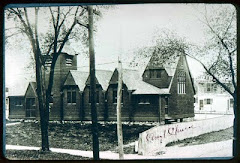People occasionally ask me, “When do you take a day off?” Others think that ministers only work on Sundays. Often things come up on the day I’d normally take off, which means somehow coming up with some creative, alternative times to break away from the duties of pastoral care. Lately I’ve been taking a few hours here and there to go kayaking in nearby rivers and lakes, but not for much longer with the cold weather coming. A pastor is never “off-duty.”
Pastoral care is task-oriented, which means one can always find more to do. With every creative idea, there’s some work involved to implement it. Emergencies arise, and lots of meetings. Then there’s the matter of sermon preparation. Clergy don’t improvise; we take seriously the preparation of messages, which helps keep our professional edge. Whenever I moved while serving as a military chaplain, the packers were always amazed at my professional library. They’d always ask, “How many books do you have, and do you read them?” They weren’t too thrilled to box them up, but they’re the tools of the trade. I’m thankful there are nearby seminary libraries in the area, but I wasn’t always so blessed.
Pastoral care has been described as being a “wounded healer.” Our own woundedness enables us to care for the hurts of others. We comfort with the same comfort we’ve received, and the compassion we’ve developed over dealing with our own pain. Before you can dry another’s tears, you have to learn to weep. And while clergy can’t identify with everyone’s issues, pain is universal and unique. We all experience it, and we do so in our own way. So while I would never say, “I know how you feel,” I do know what it means to hurt. And I know that God cares. We have the choice in our pain to become bitter or compassionate. Pain is inevitable; misery is optional.
Whenever someone meets a minister, they view that individual through the lens of their own experience and perception. It may be a positive or negative one. High profile clergy who’ve had moral failure don’t make the average pastor’s life easier. But I believe if someone acts contrary to the teachings of their religion, we blame them, not their religion. Unfortunately the actions of some can make us all look bad. An Army Corps of Engineers major was introduced to me and said with an edge to his voice, “Oh, you’re a chaplain? I can tell you about some chaplains I’ve known.” I answered, “Yes sir, and when you’re done I can tell you about some Engineers I’ve known.” He got the point. We take people as they are, as we meet them, and try not to pre-judge based on what others may have done.
Someone said to me once, “I’d hate having your job, listening to people’s problems all day long.” He was a CPA, and I told him I wouldn’t want his job either. Fortunately God has made us with diverse gifts. Most clergy have to be general practitioners. We may not do every task well, but we have to handle a lot of matters: counseling, preaching, mentoring, teaching, praying, administering the sacraments/ordinances (also baptisms, weddings, funerals), administrative matters, visitation, discipleship, worship, and maintaining professional development. We also do what’s been called “ministry of presence”, being accessible, visible in the community whenever possible. Most of us are computer-savvy, applying ministry in a technological age. I recently attended a theological update at Gordon-Conwell seminary, and nearly every minister pulled out a PDA.
Maybe you might call your minister up and ask if you can stop by for a cup of coffee, or invite your pastor to your home. Your pastor wants to get to know you better; we’re here for you. When life hurts, we want to offer consolation. When you have questions, we want to walk with you to help you find answers.
Weekend A La Carte (January 31)
4 hours ago







No comments:
Post a Comment